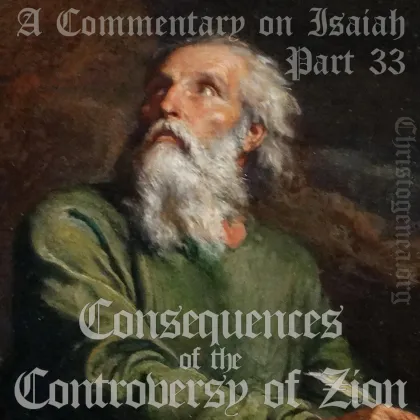A Commentary on Isaiah, Part 33: Consequences of the Controversy of Zion

A Commentary on Isaiah, Part 33: Consequences of the Controversy of Zion
Commencing with our Commentary on Isaiah, this evening we are going to do something different. Just last week, May 28th, a prerecorded podcast I had done for Jerm Warfare earlier in the month was published at UKColumn.org, and until now I had not mentioned that here. Yet the interview is very pertinent to this subject which we are discussing at this point in Isaiah because it considers the very consequences of the Controversy of Zion which is first mentioned in prophecy here in Isaiah chapter 34, and while the controversy persists through the time of Christ and down to this very day, in Scripture it is only described by that term here in Isaiah. Therefore we will present our commentary for Isaiah chapter 35, which is still discussing the consequences of the Controversy, and then we shall present the interview, which discusses its historical consequences in our modern world.
In Isaiah chapter 34, Yahweh is portrayed as having called all nations to Himself, and then announced that on account of His indignation, they are all utterly destroyed. With all certainty, this is a far-vision prophecy, as Israel, or at least much of what remains in Judah, is about to be taken into captivity, and in the later words of Jeremiah the prophet we read, in Jeremiah chapter 30: “11 For I am with thee, saith the LORD, to save thee: though I make a full end of all nations whither I have scattered thee, yet will I not make a full end of thee: but I will correct thee in measure, and will not leave thee altogether unpunished.” In the context of that chapter, the Word of Yahweh speaks of the “time of Jacob’s trouble”, and in the opening verses of Jeremiah chapter 31 it is followed by the promise that “1 At the same time, saith the LORD, will I be the God of all the families of Israel, and they shall be my people. 2 Thus saith the LORD, The people which were left of the sword found grace in the wilderness; even Israel, when I went to cause him to rest.” That is a reference to the Assyrian captivities of Israel, because when Jeremiah wrote those words, the Babylonian captivity of the remnant of Judah in Jerusalem had only been about to happen, it had not yet happened.





 Please click here for our mailing list sign-up page.
Please click here for our mailing list sign-up page.








Recent comments